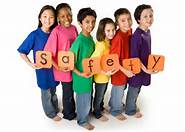10 Ways to Teach Your Children How to Protect Themselves Against Sexual Predators by Tara Woods Turner
In line with my current podcast series on child abuse, author Tara Woods Turner sent in this guest post on 10 Ways to Teach Your Children How to Protect Themselves Against Sexual Predators.
It is a frightening but simple fact that the world is often a dangerous place, especially for children, who are the most vulnerable among us. Sexual predation is one of the most harmful and prevalent forms of this danger and affects 1 in 8 individuals before the age of 18. This number may be even higher since it is not uncommon for children to keep this terrible secret into adulthood. The average pedophile victimizes children nearly 112 times before being caught so the opportunities for harm to come to our children from these individuals are widespread and often undetected until it is too late.
There are many ways in which parents and caregivers can educate themselves in order to better protect their children from sexual victimization. Books, online articles and seminars given by local law enforcement and family therapists are excellent ways for parents to arm themselves with the knowledge vital to the ongoing goal of raising children in a healthy, safe environment.
In addition to these steps parents must also teach their children ways in which they can protect themselves and help decrease the chances that they will fall victim to a sexual predator. Below are ten important conversations parents should be having with their children about this issue.
-
Teach kids the difference between obedience and boundaries.
In a simpler time it was expected that children would do what any authority figure asked them to without question or resistance. Obedience has always been a valued indication of a child’s proper upbringing and many parents instill in their children the belief that adults know what is best and it is rude to disagree with or disobey them. For the most part this is an important way to instill respect within children and prepare them for a world in which cooperation and discipline are components of success. However, this lesson should be tempered with a healthy understanding that even obedience has boundaries and children should understand what these boundaries are. One way to achieve this is with examples, which children find easy to comprehend. You would ask a child if it is good to be kind to other children, to which he would likely answer yes. Then ask him does that kindness mean he should allow other children to hurt him or break his toys. He will then say no because he naturally understands that there are boundaries. Use this example to then explain that the same is true for interactions with adults. Children should obey and respect adults unless they are asked to do something that violates boundaries you have already defined and discussed with them in detail beforehand. It is also extremely important to leave room for situations in which children may be unsure what the boundaries are but feel they may be compromised. It is crucial that the spirit of the rule be understood because specific circumstances may vary and children need to know that each predator may use different tactics to avoid outright violation of these rules, at least initially.
-
Avoid harmful assumptions about potential threats.
Keeping an open mind about the potential sources of harm helps you and your children from being lulled into a false sense of security. Avoid stereotypes and assumptions that may prevent children from being aware of threats in any situation. Resist the temptation to tell children to only watch out for unwanted attention from the opposite sex, for example. Predation is not limited to same-sex gender by any means and indeed, many people in same gender circumstances such as athletic and non co-ed academic situations are as much in danger of being victimized as those in mixed gender ones. It is just as important to teach children that a person’s appearance is no indication that they are or are not potential abusers. A well-dressed, friendly person has the same potential to victimize children as one who is shabbily dressed and reclusive. This is especially important because many abusers have attained positions of trust within the community and may be members of the clergy, law enforcement, the education system etc. In many instances, family members, neighbors and coworkers are stunned to find out that someone they know has been accused of sexual molestation because they looked and seemed like “such a nice person”.
Another assumption to avoid is one that says that sexual predators are lurking around corners in our neighborhoods or hiding behind bushes in the park. The majority of sexual abuse cases involves people that the child and his or her family are familiar with, including family members. Along these lines, teach children about the very real dangers of online predation and alert them to the fact that it can prove as threatening and deadly as face-to-face encounters in just a few clicks of the mouse.
-
Teach your children about autonomy.
When children have a firm sense of who they are as individuals they are given a platform upon which to build self-respect and self-advocacy. Both of these qualities make it more difficult for a predator to convince children that what they want to do is right and normal. Giving children a voice allows them to use it to protect themselves. No one wants to see children become obnoxious or self-centered but teaching them that they matter and have great value is far more important in the long-run when it comes to keeping them safe. Make sure your children thoroughly understand that their bodies belong to them and they have full rights and responsibilities when it comes to physical contact. Even as parents it is not a bad idea to ask your children for permission to hug them, especially when they are upset. This may sound extreme but the point is to get them used to having ownership over their bodies and their personal space. Make a point of remaining with them during physical exams, even dental and optometric ones – explaining the reasons behind your actions. Knowledge is power and every step you take to protect them becomes part of their own arsenal as they learn to protect themselves.
-
Help your children define and establish boundaries.
It is important not to take for granted that children will automatically understand this concept. Establish what boundaries are in both a physical and an emotional sense with your children. Traditionally this has included teaching children not to allow strangers to touch their private parts or genitalia. Times, however, have changed and a clearer, more concise approach is necessary. Predators may not always start with so explicit a gesture and may escalate or groom their victims – often starting with caresses in a “safe” or innocuous area in order to get their victims used to being touched. It is better to teach your children that absolutely any unwelcomed or unsolicited touch should be verbally discouraged and reported to a trustworthy adult. This frees children from trying to figure out which body parts fall under the no touch rulesand simply allows them to use their intuition and personal preference to protect themselves. An arm around the shoulders may not be unwelcome by one child but may make another feel extremely uncomfortable.
-
Create an atmosphere of honesty with your children.
This should extend to absolutely every aspect of your relationship with not only your children but your partner and extended family and acquaintances as well. A family dynamic in which children see complete truthfulness as a way of life is one in which they will be more comfortable being forthright and upfront about what is going on in their own lives. For this reason don’t be afraid to let your children see you apologize when you make mistakes or own up to shortcomings when you could have made better choices. This sends a powerful message – children learn that family and home is a safe space where no one is condemned for mistakes or made to feel ashamed or discarded when things go wrong or perfection is not achieved. Many children are afraid to report sexual abuse not only because they have been frightened into silence but because they aren’t mature enough to understand they are not at fault and they do not want to disappoint or anger their parents. Expectations of perfection from children can be a strong motive for them to become secretive and unwilling to trust adults. Predators can easily pick up on this insecurity and use it to their advantage.
-
Open the channels of communication with your children.
This ties in closely with #5. Giving your children the benefit of a family environment that fosters openness and communication is another tool that will help keep them safer. Teach your children to share things about their day to day experiences, both good and bad. Listen with an attentive, open mind and offer your opinions and feedback in a supportive, structured way. Encourage your children to trust you by earning their trust. Keep the channels of communication open and don’t be afraid to allow your child to take the lead from time to time in the conversation. It is often surprising how much our children reveal when they are allowed to speak freely and with the knowledge that their parents are taking them seriously.
-
Teach your children the basics of personal physical safety.
Many of these lessons will be based on age and the daily habits of your children. For example you may teach your six year old son to avoid talking to strangers while you may teach your 17 year old daughter not to walk to her car alone after her shift ends at after-school job. Regardless of the particulars make sure you seek the advice of professionals when it comes to this task. This may sound extreme but you will be quite surprised how many details escape your attention when you set out to teach your children about safety compared to what a personal safety expert or police officer may teach them. It also sends the message to your children that you are extremely serious about their ability to protect themselves. If there are few experts in your area that provide this service order books and instructional dvds online. If this is truly a question of few local resources consider organizing a viewing party at home with other families and discuss the material afterwards. Some topics to cover include physical safety, threat management, protecting personal data, warning signs of unsafe environments, dealing with stalkers, sexual aggression from acquaintances, sexual harassment etc.
-
Educate your children about protection resources.
Again, never assume children will just know what to do if they feel threatened by a sexual predator or are aware of a situation that may be affecting friends or acquaintances. have several conversations with them where a plan of action is clearly established should any situation, whether uncomfortable or explicit, arise. Even though it is terrifying to think your children would not come to you should the need ever arise it is still important that they be given alternate, even anonymous, resources in the event that they are being victimized or know of a situation where someone they know is being abused. The most important thing is that they get help immediately and that the abuser is apprehended.
-
Raise your children to embrace advocacy.
A natural distillation of compassion and empathy is advocacy and children who possess these admirable qualities are in an even better position to protect themselves, their siblings and their peers against predation. It is important that a clear distinction be made here between advocacy and intervention. In no way and under no circumstances is it safe or advisable for children to approach a known or suspected sexual predator about his or her abuse. This can not be overstressed. Teach your children in no uncertain terms that these situations must always and without question be handled by trusted adults and authority figures such as school personnel, law enforcement etc. Advocacy, in this sense, refers to your children’s ability to provide emotional and strategic support to friends and acquaintances. When children understand their worth and have worked with their parents to understand boundaries they are better able to speak up for those around them as well as themselves. A child who knows it is not right to harm others certainly sees that it is unacceptable to allow others to harm him. A network of advocacy is made possible. Developing this instinct in your children not only empowers their own sense of self-protection but it sharpens their instincts for the rights of those around them and makes them a natural resource for other children who may feel too afraid to tell an authority figure that they are being abused. Teach your children the warning signs to look for such as the unexplained withdrawal or moodiness of a peer, especially when the same individual happens to be in contact with them or in the vicinity. Knowledge and a keen eye may be the difference between safety and victimhood for your children and their friends and acquaintances.
-
Teach your children to trust their instincts.
Finally give your children permission to listen to and trust their instincts. It is impossible to lay out clear rules for every situation in which children may find themselves in the hands of a sexual predator. While it is crucial to establish boundaries it is just as important to teach our children that it is okay for them to respond to how they feel and act on their gut instincts. If they feel uncomfortable with someone’s touch, no matter how innocent, they have every right to speak up about it or bring it to the attention of a trusted adult. If their instinct tells them that something is not quite right with a friend or acquaintance teach them the proper way to better understand the situation. This may mean a private conversation with a parent or with the friend in question – both of which could lead to that friend getting the help they need, despite the reason. Children may not always be able to adequately articulate what is bothering them but by teaching them it is okay to not always have a clear-cut explanation or reason for their feelings we are teaching them that their value and safety far exceeds our adult need for everything to make sense. This could be the difference between our children’s silence and their safety.
Despite being attentive and proactive it is impossible for parents to be with their children 24/7. But every parent can rest somewhat better knowing that they have equipped their children with the tools and skills they need in order to protect themselves as they navigate a world that doesn’t always have their best interests at heart.
About Tara Woods Turner
Tara Woods Turner is an etiquette consultant, best-selling author and online content contributor. As author of the Beyond Parenting series Tara has been a frequent guest on radio talk shows, podcasts and blog spotlights. A Salisbury, NC native, she currently lives in New York, NY with her husband and her hyperactive puppy, Catherine. Tara believes strong families build strong societies and spends far too much time analyzing James Taylor lyrics.
***
What are your thoughts on Tara’s 10 Ways to Teach Your Children How to Protect Themselves Against Sexual Predators? Please leave a comment below.
There’s love in sharing, so please click on one of the social icons to share this post with your network. Feel free to republish this post on your blog from the 1st of January 2017. Just be sure to acknowledge you got it from my blog first and include the URL. Many thanks





